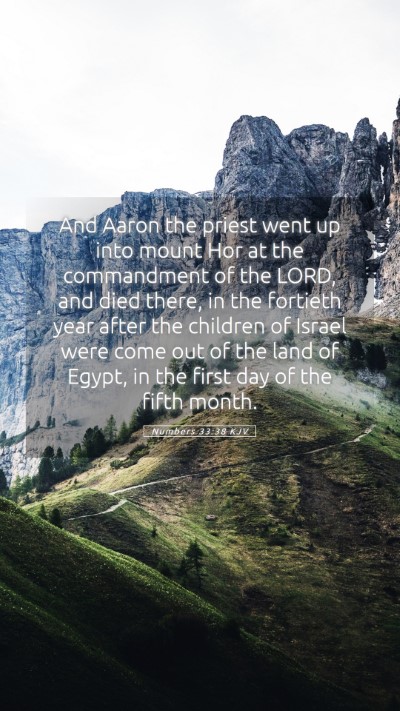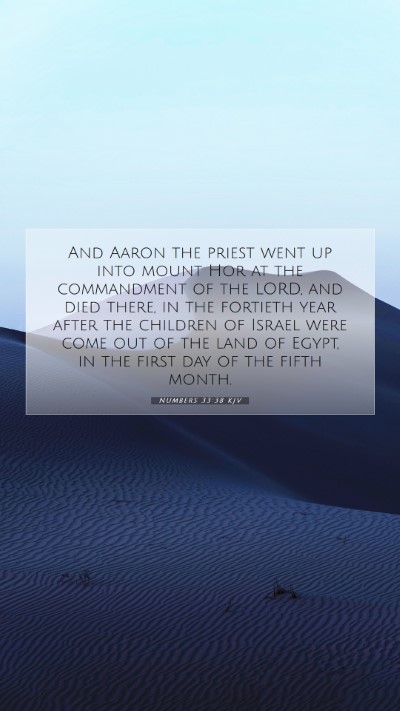Bible Verse Meaning and Explanation: Numbers 33:38
In Numbers 33:38, we read about the death of Aaron, the brother of Moses, as he ascends Mount Hor. The verse highlights a pivotal moment in the history of the Israelites during their journey through the wilderness. Understanding the depth of this scripture requires a careful analysis of its context, themes, and the legacy of Aaron, as well as the broader narrative of the Exodus.
Contextual Background
This verse occurs towards the end of the journey of the Israelites through the wilderness, a time marked by trials, teachings, and God's provision. It is essential to consider the historical context of the Israelites’ extended wanderings and their leadership under Moses and Aaron.
Summary of Commentaries
-
Matthew Henry's Commentary:
Matthew Henry emphasizes the significance of Aaron's death not only as the loss of a high priest but also as a transition point for the nation of Israel. It serves as a reminder of the mortality of leaders and the importance of remaining faithful to God’s commandments. His commentary encourages readers to reflect on the implications of leadership and God's continued guidance even after key figures depart.
-
Albert Barnes' Commentary:
Albert Barnes addresses the geographic importance of Mount Hor and notes Aaron's anointing as high priest, marking his special role among the people. Barnes suggests that Aaron’s death is significant in reinforcing the idea of divine order in leadership succession. His commentary highlights the spiritual lessons that can be drawn from this event regarding trust in God during transitions.
-
Adam Clarke's Commentary:
Adam Clarke analyzes the specific details surrounding Aaron’s death, linking it to the broader covenantal themes within the Pentateuch. Clarke notes that Aaron was not allowed to enter the Promised Land due to past disobedience, signifying the serious nature of sin and its consequences. His interpretation invites readers to contemplate the justice of God and the need for obedience among His people.
Theological Insights
The theological implications of Numbers 33:38 extend beyond the immediate narrative. The death of Aaron signifies the end of an era and the ongoing journey of faith for the Israelites. It invites believers to grapple with themes of leadership loss, continuity of faith, and the nature of God’s promise to His people. Each commentary offers a window into how this verse invites reflection on leadership, accountability, and the faithfulness of God.
Application of Scripture
The practical application of Numbers 33:38 encourages believers to consider the nature of their spiritual leaders and the impermanence of life. With questions about what it means to follow God’s lead during changing times and how to honor the legacy of those who guide their faith. It also prompts a personal examination of one’s own journey in relation to faithfulness and reliance on God’s promises.
Related Biblical Cross References
- Leviticus 10:1-3 - Aaron's priesthood and the consequences of disobedience
- Numbers 20:22-29 - The death of Aaron and the transition of leadership
- Hebrews 5:4 - Reflection on the priesthood and its divine call
Conclusion
Overall, Numbers 33:38 offers profound insights into the intricate tapestry of leadership, faith, and God's covenant with the Israelites. As believers reflect on this passage, may they find guidance through Scripture analysis and deepen their understanding of the timeless truths found within the Bible. Using various Bible study tools and resources, individuals and groups can engage with this verse more fully, exploring its meanings and applications in their own lives.


